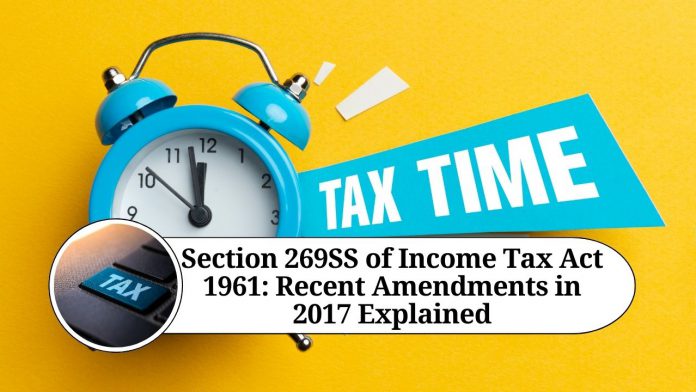Understanding Section 269SS of the Income Tax Act 1961 Amendments 2017
The Income Tax Act, 1961 is the governing legislation that outlines the tax rules and regulations in India. Section 269SS of the Income Tax Act is one such provision that governs the acceptance of loans or deposits by an individual or a company. In 2017, this section was amended to include certain new provisions. In this blog, we will take a closer look at Section 269SS of the Income Tax Act, its amendments in 2017, and its implications for taxpayers.
Section 269SS – Overview
Section 269SS of the Income Tax Act prohibits any person from taking or accepting any loan or deposit, whether in cash or otherwise, from another person if the amount exceeds Rs. 20,000. The provision applies to all individuals and entities, including companies, firms, and associations of persons.
The purpose of this section is to prevent the circulation of unaccounted money or black money in the economy. By imposing restrictions on the acceptance of loans or deposits, the government aims to curb the generation and flow of black money.
Amendments to Section 269SS in 2017
In 2017, Section 269SS was amended to include certain new provisions. These amendments aimed to increase the compliance level of taxpayers and reduce the circulation of black money.
- Exemptions for Certain Transactions
One of the key amendments to Section 269SS was the inclusion of exemptions for certain transactions. Under the new provisions, loans or deposits taken or accepted by government entities, banking companies, post offices, or other financial institutions are exempted from the purview of Section 269SS.
- Penalty for Violation
The penalty for violating the provisions of Section 269SS was increased from 100% to 200% of the amount of loan or deposit. This means that if a taxpayer is found to have violated the provisions of Section 269SS, they will have to pay a penalty that is twice the amount of the loan or deposit they have taken or accepted.
- Exceptions to Penalty
Under the amended provisions, there are certain exceptions to the penalty for violation of Section 269SS. If the taxpayer can prove that there were genuine reasons for accepting the loan or deposit in cash and that they did not have the means to pay by any other mode, the penalty may be waived off.
Implications of Section 269SS for Taxpayers
The provisions of Section 269SS have significant implications for taxpayers. Failure to comply with the provisions of this section can result in hefty penalties, which can significantly impact the financial position of the taxpayer. Therefore, it is essential for individuals and entities to ensure compliance with the provisions of Section 269SS.
Conclusion
Section 269SS of the Income Tax Act is a crucial provision that regulates the acceptance of loans or deposits by individuals and entities in India. The 2017 amendments to this section have increased the compliance level of taxpayers and reduced the circulation of black money. Taxpayers should be aware of the provisions of Section 269SS and ensure that they comply with them to avoid any penalties.
Other Related Blogs: Section 144B Income Tax Act
Frequently Asked Questions (FAQs)
Q. What is Section 269SS of the Income Tax Act 1961 Amendments 2017?
Section 269SS of the Income Tax Act 1961 Amendments 2017 is a provision that prohibits any person from taking or accepting any loan or deposit, whether in cash or otherwise, from another person if the amount exceeds Rs. 20,000.
Q. What is the purpose of Section 269SS?
The purpose of Section 269SS is to prevent the circulation of unaccounted money or black money in the economy. By imposing restrictions on the acceptance of loans or deposits, the government aims to curb the generation and flow of black money.
Q. Who is affected by Section 269SS?
Section 269SS affects all individuals and entities, including companies, firms, and associations of persons, who accept loans or deposits from another person if the amount exceeds Rs. 20,000.
Q. What are the exemptions under Section 269SS?
Under the amended provisions, loans or deposits taken or accepted by government entities, banking companies, post offices, or other financial institutions are exempted from the purview of Section 269SS.
Q. What is the penalty for violating Section 269SS?
The penalty for violating the provisions of Section 269SS was increased from 100% to 200% of the amount of loan or deposit. This means that if a taxpayer is found to have violated the provisions of Section 269SS, they will have to pay a penalty that is twice the amount of the loan or deposit they have taken or accepted.
Q. Are there any exceptions to the penalty for violation of Section 269SS?
Under the amended provisions, there are certain exceptions to the penalty for violation of Section 269SS. If the taxpayer can prove that there were genuine reasons for accepting the loan or deposit in cash and that they did not have the means to pay by any other mode, the penalty may be waived off.
Q. What are the implications of Section 269SS for taxpayers?
The provisions of Section 269SS have significant implications for taxpayers. Failure to comply with the provisions of this section can result in hefty penalties, which can significantly impact the financial position of the taxpayer. Therefore, it is essential for individuals and entities to ensure compliance with the provisions of Section 269SS.




















